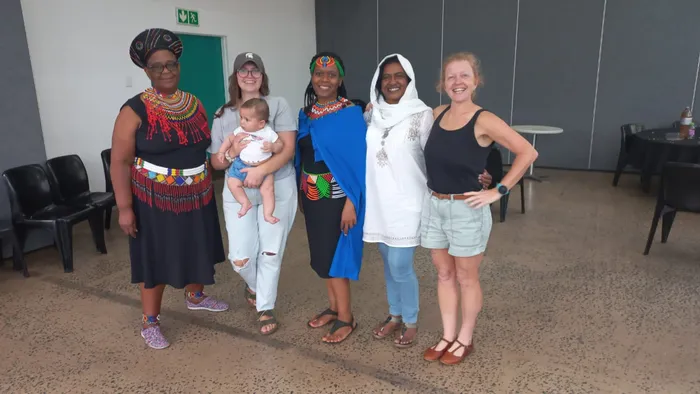Celebrating different cultures that coexist in Durban

Some members of the team at the Denis Hurley Centre celebrating their different cultures during Heritage Month. L to R: Nurses Dudu Ntombela and Maighlin Andrew, Thembeka Mchunu, Sr Cathy Murugan, Leanne Banks. Photo: Supplied
South Africa is a multicultural society with diverse African cultures, languages, and traditions.
Raymond Perrier, the director of the Denis Hurley Centre, said for the past 10 years he has seen a melting pot of cultures at the centre, promoting diversity and unity.
Perrier said their staff included people from many nationalities and cultures such as Zulu, Indian, European, German, Congolese and British and they served refugees from different African countries.
“We are always keen to celebrate what we have in common while also celebrating diversity, but without allowing differences to come between us,” said Perrier.
He said they celebrate all of the African cultures and by doing so, they highlight how African cultures from other countries can coexist with South African culture.
“Durban is the most culturally diverse city in the country. The majority of our homeless people are South African Zulus and the majority of our refugees are from African countries. The staff is made of an entirely black team, they're Africans from different parts of the continent and different language groups within South Africa.
“We deliver services to homeless people and refugees by drawing from their own cultural heritage. Everyone draws on each other's strengths. If we need somebody to translate, we help each other. We see integration of cultures through food, music and other traditions and by doing so, we become united,” said Perrier.
Dr Sihawukele Ngubane, a lecturer of African Languages and Culture at the University of KwaZulu-Natal, has been an activist for African identity in South Africa and said there were many things that brought African cultures together.
“South Africa is a multicultural society with diverse African cultures, languages, and traditions.
“Multilingualism in South Africa unites communities that speak different languages, fostering cultural exchange through traditional music, dance, art, and crafts. Inter-ethnic marriages are common in the South, promoting cultural insights and integration, causing coexistence,” said Ngubane.
He said South Africa’s diverse African cultures coexist through a complex interplay of tradition, language, and history, adding that multilingualism forces the people of South Africa to learn how to speak multiple languages, promoting cross-cultural understanding.
“Traditions such as ukulobola bring about language exchange, where each ethnic group learns and uses another’s language. Language conveys cultural values, traditions, and issues of identity. South Africa fosters a unified cultural identity by promoting multilingualism, language education, and cultural exchange by celebrating its diverse linguistic heritage,” said Ngubane.
Most interesting about culture is language, said Ngubane. He found that even those from outside the country learn indigenous languages long before they come to South Africa due to cross-border languages such as Sesotho, Setswana, SiSwati, and many others.
IsiZulu was also spoken outside the country in most Ngoni countries, like Mzimba district in Malawi, Tanzania, and Kwa Bulawayo in Zimbabwe.
“South Africa is home to a rich and diverse cultural heritage, reflecting its complex history and multifaceted African identity. Language and culture are the cornerstones of African identity, and South Africa is unique in its cultures and religions. Culture is important for social cohesion and unity. It promotes nation-building and friendship among African societies,” said Ngubane.